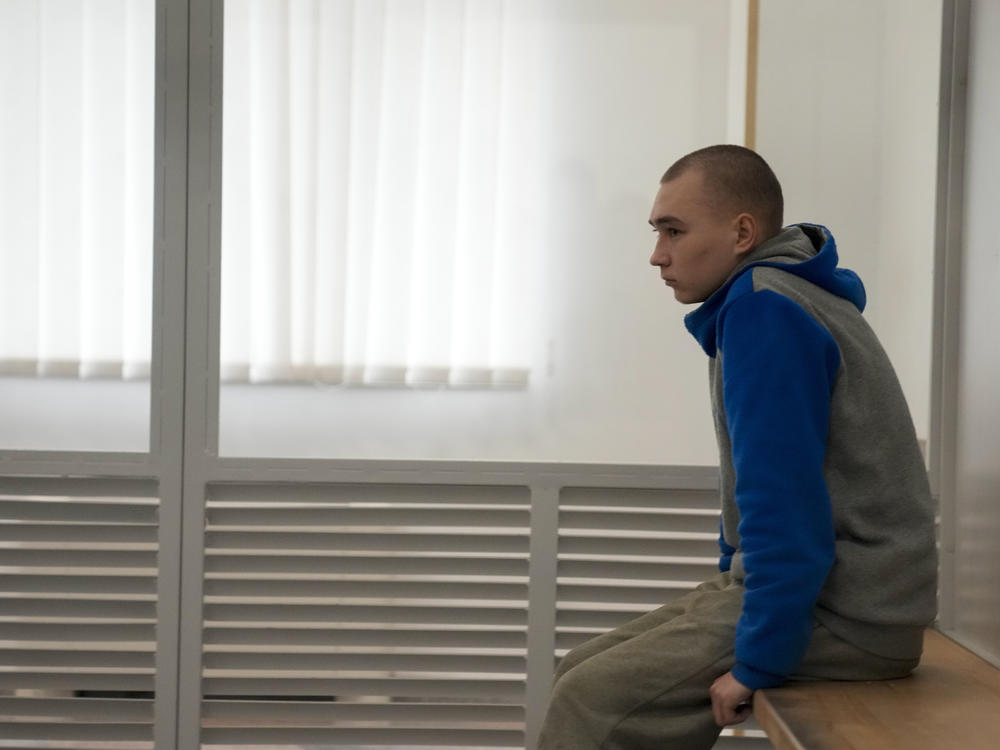Section Branding
Header Content
A Russian soldier is sentenced to life in prison in Ukraine's first war crimes trial
Primary Content
The first Russian soldier on trial for war crimes in Ukraine has been sentenced to life in prison for killing a civilian.
Army sergeant Vadim Shishimarin, 21, pleaded guilty last week to fatally shooting an unarmed Ukrainian man in the earliest days of the war. On Monday, a panel of judges in Kyiv found him guilty of "violation of the laws and customs of war, connected with premeditated murder" and sentenced him to life, Prosecutor General Iryna Venediktova wrote on Facebook.
"Given that the crime committed is a crime against peace, security, humanity and the international legal order ... the court does not see the possibility of imposing a (shorter) sentence of imprisonment on Shishimarin for a certain period," said Judge Serhiy Agafonov, according to Reuters.
The incident took place on Feb. 28 in Chupakhivka, a village in the Sumy region about 180 miles east of Kyiv.
A pretrial investigation found that Shishimarin and several other soldiers had stolen a car to try to escape the village after their armored vehicle broke down. That's when they saw the man walking his bike on the sidewalk and talking on the phone, and feared he might be revealing their positions. After his colleagues urged him to shoot the man, Shishimarin fired his Kalashnikov several times through the car's open window.
"The victim was 62-years-old - he died on the spot from gunshots in the head by a 21-year-old soldier of the foreign army," Venediktova said.
The prosecution had presented compelling evidence against Shishimarin, including matching the ballistics from the scene to his gun. They also had testimony from a friend of the victim and one of the since-captured Russian soldiers, both of whom witnessed the shooting.
Shishimarin pleaded guilty to the charge against him on Wednesday. In one dramatic moment during the trial, the man's widow, Kateryna Shelipova, asked him directly how it felt when he shot her husband. Shishimarin, who took responsibility for his actions, asked for her forgiveness but acknowledged he was unlikely to get it.
"I feel very sorry for him but for a crime like that – I can't forgive him," Shelipova later told the BBC.
Reuters says that Shishimarin showed no emotion as the verdict was read out on Monday. His Ukrainian court-appointed lawyer, Victor Ovsyanikov – who had argued that Shishimarin opened fire only because he was ordered to do so and that his shots were aimless – told journalists that he plans to appeal the ruling, according to The Washington Post.
While Shishimarin's case is the first of its kind since Russia launched its full-fledged invasion in late February, it's not likely to be the last. Ukrainian officials say they have documented more than 11,000 possible Russian war crimes so far.
And they want to respond quickly, collecting evidence and locating witnesses even as the war continues, rather than trying to reconstruct the cases down the road
While the International Criminal Court has already sent a large team of investigators to Ukraine for this purpose, Russia is neither part of that body nor is expected to cooperate with the process. Ukraine may in practice be the only entity that's able to prosecute these alleged war crimes.
Russia has said Shishimarin's case and other similar claims of Russian atrocities against Ukrainian civilians are fake or staged.
Kremlin spokesperson Dmitry Peskov said ahead of the verdict that Russia was "concerned" about Shishimarin.
"Unfortunately, we are unable to defend his interests on the ground," he said, according to The Washington Post. "This is due to the de facto lack of operations of our institutions [in Ukraine]. But this does not mean we will stop considering ways to continue our efforts through other channels."
Meanwhile it's possible that Russia could start holding war crimes trials of its own.
Last week as Shishmarin was taking the stand, Ukrainian soldiers were surrendering at the besieged steel plant in Mariupol. Russians have called them Nazis, and some politicans are calling for them to be put on trial – even though the Geneva Conventions say combatants can't be put on trial just for taking part in battle.
National security reporter Greg Myre contributed to this report.
Copyright 2022 NPR. To see more, visit https://www.npr.org.

